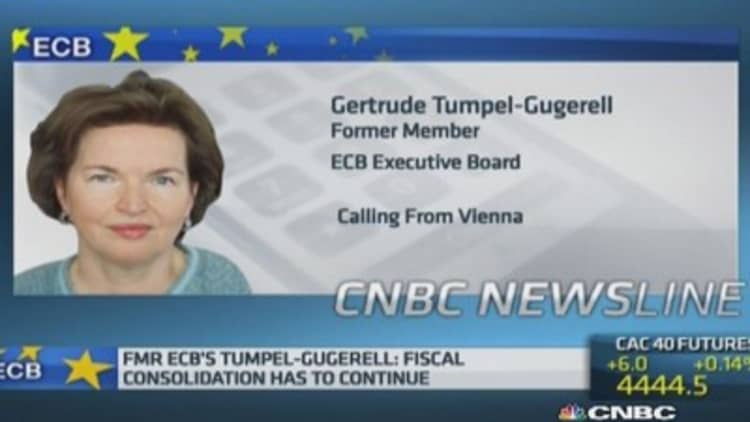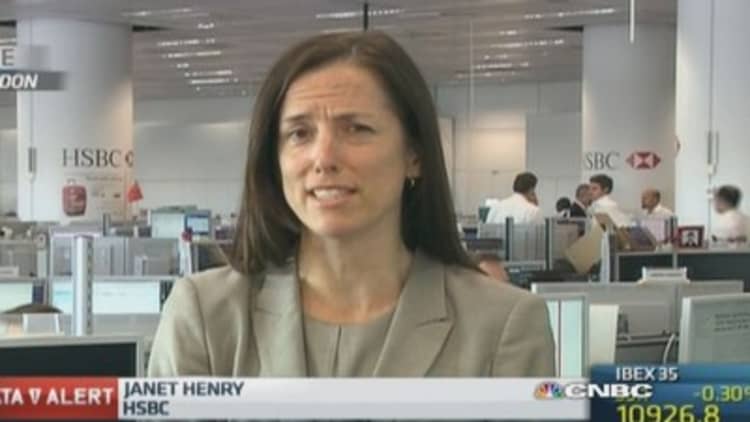After revealing a host of stimulus measures at its last meeting, the European Central Bank (ECB) is unlikely to act on Thursday—but that hasn't stopped a number of analysts saying that more stimulus is needed.
In an unprecedented move last month, the ECB imposed a negative interest rate on banks for their deposits—in effect charging lenders to park money with it. It was one of a host of measures designed to boost lending, spur the euro zone's recovery and combat growth-sapping disinflation.

As such, few expect more from ECB President Mario Draghi on Thursday.
"The ECB has announced a very comprehensive package and therefore I think it's important to wait for the effect of these measures," Gertrude Tumpel-Gugerell, former ECB executive board member, told CNBC.
Read MoreEuro zone inflation steady ahead of ECB meeting
While Carsten Brzeski, senior economist at ING, added: "Following the June fireworks, we expect the ECB to take it easy."
But worryingly low inflation—which has dogged the region's stuttering recovery—persisted last month, amid concerns the region could be heading towards a period of deflation.
In June, consumer price growth held steady at 0.5 percent, but remained well below the ECB's target of around 2 percent. Before this year, inflation was last at 0.5 percent in November 2009.
This rate of inflation is "dangerously weak", according to Jennifer McKeown, senior European economist at Capital Economics.
Draghi breaks new ground with negative interest rate
"June's weak euro zone inflation figures will add to pressure on the ECB to provide more policy support, particularly given recent signs that the recovery may already be slowing," she wrote in a note.
Two closely watched economic indicators—Markit's Purchasing Managers' Index and the European Commission's Economic Sentiment Indicator—weakened in June. It comes after the euro zone's economy grew by just 0.2 percent in the first three months of the year, quarter-on-quarter.
"While the bank is unlikely to act again at its meeting this week, we think that it will ultimately implement a large scale quantitative easing program to tackle the risk of deflation," McKeown added.
Lending woes
At last month's meeting, ECB President Mario Draghi said the bank had undertaken "preparatory work" for a U.S. Federal Reserve-style bond-buying (or quantitative easing) program. The ECB would purchase asset-backed securities (ABS) from banks in the hope that they would respond to the capital boost by increasing lending across the economy.

Lending is a sign of a buoyant economy, but credit conditions have been tight in the euro zone since the financial crisis of 2007-2008 took hold. In May, loans to the private sector fell more than expected, sliding by 2 percent on an annualized basis, according to ECB data.
Annual growth in M3—a broad measure of cash in the economy—hit 1 percent in May, higher than expected, but still well below the ECB's old reference rate of 4.5 percent. During the boom times of 2007, M3 annual growth was closer to 12 percent.
The central bank attempted to address liquidity issues by launching a new package of LTROs (long-term refinancing operations) at its last meeting. These ultra-cheap, long-term loans will be offered from September to the region's banks, and will be targeted at boosting lending to smaller businesses.
"The ECB will be hoping that their package of fresh LTRO funds can boost this (lending) number; however this data reinforces the uphill battle the bank has to encourage demand for loans," Kathleen Brooks, research director at Forex.com, said in a note.
Read MoreThe ECB eases and the euro… rises?
ING's Brzeski questioned whether the LTROs will really make a difference.
"One crucial question is whether the ECB can really prevent banks from using the cheap money to invest in two-year government bonds," he wrote, adding that the penalty for not doing so—earlier reimbursement—is not very strong.
Brzeski added that it could take until the end of the year for the measures to have any significant impact on lending—one reason Howard Archer, chief European economist at IHS Global Insight, expects the ECB to hold fire on Thursday.
However, Archer stressed that the combination of low inflation, falling bank lending to business and muted money supply growth meant that expectations the ECB will ultimately have to take further action "remain pretty high".
"The ECB will likely want the market to keep thinking that further policy action is a very real possibility so as to keep downward pressure on the euro and market interest rates," he said in a note. "However, we still suspect that the bar for large scale, full-blown quantitative easing by the ECB is high."
—By CNBC's Katrina Bishop


